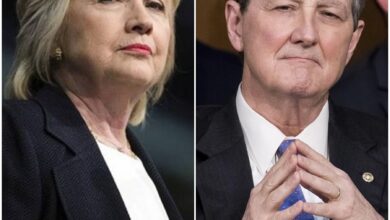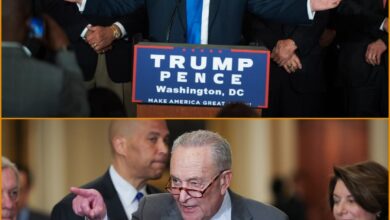doem “I WAS A CHILD. I WAS FIFTEEN.” — Melissa Gilbert’s Viral Response to Megyn Kelly Rocks the Internet
A few words can change a conversation. A few words can ignite debate. And a few words — in the right context — can stop millions in their tracks. This week, that happened when Melissa Gilbert, the beloved former star of Little House on the Prairie, spoke out in response to Megyn Kelly’s controversial comments about Jeffrey Epstein.
During a discussion about Epstein, Kelly stated that the financier “liked 15-year-old girls” and “wasn’t into 8-year-olds.” While intended as commentary, her phrasing struck a nerve. Gilbert responded with precision, courage, and an emotional weight that social media could not ignore.
“Be careful with your words,” Gilbert wrote.
That wasn’t all. Accompanying her statement was a photo of herself at 15, taken on the set of Little House on the Prairie. In the image, a younger Gilbert is poised on set, expected to kiss a male co-star several years her senior — a moment she describes as “nauseating.” The reality behind the innocent television scene is now reverberating across the internet, forcing a collective confrontation with Hollywood’s past.
❗ The Shock of Hollywood’s Hidden Norms
Gilbert’s revelation isn’t merely about one uncomfortable moment. It highlights a larger, systemic problem: the way child actors were historically treated as adults in adult situations. Scenes like on-set kisses, love storylines, and other “mature” scenarios were often presented as routine, even when they placed young performers in unsafe, coercive positions.
Melissa’s post reminded the world that what might appear innocent on screen often had darker undertones behind the cameras.
“I am actually nauseated… I was expected to ‘fall in love with’ and kiss a man several years older. I WAS A CHILD,” Gilbert wrote.
Her honesty is unnerving precisely because it shows how normalized these practices were — and how many children went unprotected.
❗ Gratitude and Protection: The Lucky Ones
Not all child stars survived such experiences unscathed. Gilbert made it clear that her safety was a matter of luck and the protection of key adults in her life, including her mother and co-star Michael Landon. She acknowledged their vigilance as the difference between an experience she survived and one that could have left lasting trauma.
“What if I didn’t have them?” she asked — a haunting reminder of how many young performers didn’t have advocates on set.
This reflection has resonated widely, as fans and former child actors alike share similar stories of vulnerability, exploitation, and survival. The internet is flooded with messages of solidarity, shock, and support.
❗ The Social Media Explosion
Once Gilbert’s post went live, the response was instantaneous. Across X, TikTok, Instagram, and Facebook, users debated the implications:
- Some praised Gilbert’s bravery, calling her a voice for survivors:
- “She is speaking truths that Hollywood tried to hide for decades.”
- “I can’t imagine the courage it took to post this.”
- Others focused on the broader implications for Kelly’s comments:
- “Even phrasing matters. 15-year-olds are still children. Language shapes perception.”
- “This is a lesson for media: words have consequences, especially when discussing abuse.”
The conversation extended beyond celebrity gossip. Comment sections evolved into forums discussing child protection, systemic abuse in entertainment, and how past norms must be re-examined today.
❗ Why This Moment Matters
Melissa Gilbert’s response is more than a celebrity clapback. It’s a reckoning. It asks society to confront uncomfortable questions:
- How often were children coerced into adult scenarios under the guise of acting?
- How should media and audiences reckon with abuses that were normalized for decades?
- What responsibility do adults on set — parents, directors, co-stars — have to protect minors in high-pressure environments?
Her statement isn’t an accusation aimed at individuals alone; it’s a broader critique of Hollywood culture, one that continues to reverberate through discussions on workplace safety, consent, and accountability.
❗ Hollywood Reckoning and the Public Conversation
In the wake of Gilbert’s post, there has been a resurgence of discussions about past abuses in film and television. From documentaries to oral histories, stories of former child stars are being revisited, analyzed, and shared, fueling debates about accountability and the ethical responsibilities of entertainment industries.
Gilbert’s honesty has opened a door for dialogue: survivors are speaking up, fans are listening, and media outlets are being forced to reconsider how they report on historical abuses. The debate isn’t just about a single scene or a single star — it’s about the systemic treatment of children in the industry and how the past continues to influence perceptions today.
❗ The Question Everyone Is Asking Now
The post has left fans and commentators pondering:
How many similar moments were normalized on set, unnoticed by the public? How many young actors were coerced into adult situations and never had protection?
Gilbert’s revelation reminds the world that, behind the innocence of childhood television, there were moments of vulnerability, coercion, and survival. Her words are a wake-up call, prompting a re-evaluation of history, language, and responsibility in entertainment.
❗ A Viral Moment With Lasting Impact
Melissa Gilbert’s post has all the elements of a viral moment: shock, courage, emotional gravity, and a broader societal issue. It’s sparking debate in households, newsrooms, and online forums worldwide. And unlike fleeting celebrity controversies, this is a conversation with moral, cultural, and historical weight.
It isn’t just about Megyn Kelly’s phrasing. It isn’t just about a television scene from decades ago. It’s about the broader lesson: child actors are children, and the industry — and society — has an obligation to protect them.
By posting her story, Gilbert has forced the conversation into the public sphere, ensuring that the discussion about Hollywood’s treatment of children will continue far beyond a single viral post.
❗ Conclusion
Melissa Gilbert’s three words — “I WAS A CHILD” — are more than a statement. They are a warning, a testament, and a call to action. They remind us that words have power, that history cannot be ignored, and that accountability matters.
Social media may buzz for days or weeks, but the underlying truth is enduring: the past shapes the present, and Gilbert’s courage is helping the world confront it.

